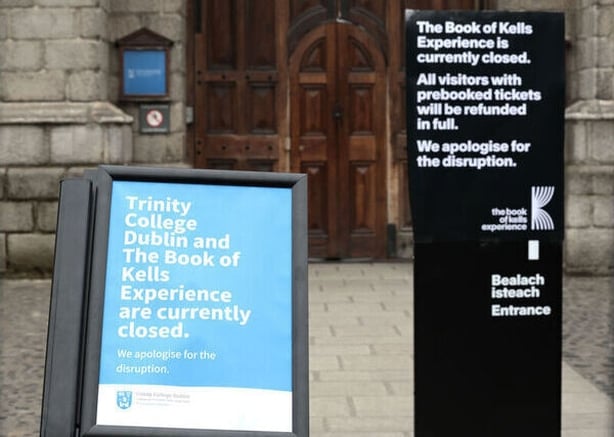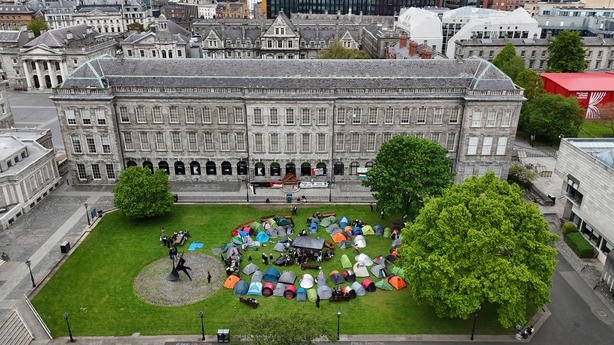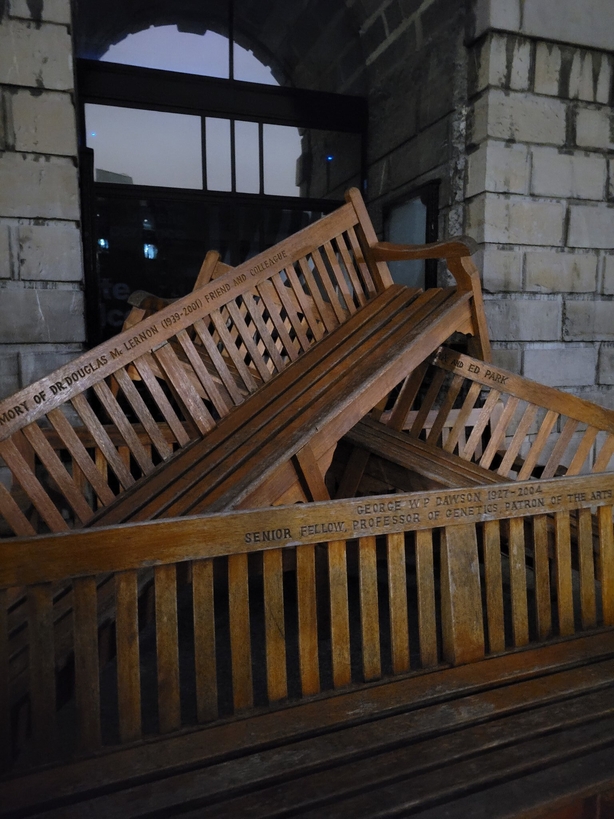The Book of Kells and Trinity College's campus will be closed to the public "until further notice" due to an ongoing pro-Palestinian student protest camp taking place on its grounds.
A Trinity College spokesperson said while the university "respects the strong stance expressed" by people taking part in the protest, it also has a "duty of care" to the safety of all staff and students.
On Friday evening, Trinity College closed its doors to the general public due to rumoured plans for a pro-Palestinian protest camp on its grounds.
The situation, which also affected access to the Book of Kells, led to security personnel being placed at entrances into Trinity College, stopping anyone who was not a staff member or a student from entering.
The security measures continued today.
Students also blocked the entrance to the Book of Kells with benches.

This evening, the university confirmed it will not re-open its campus doors to the public "until further notice" due to the ongoing protest camp.
In a statement to RTÉ News, a Trinity College spokesperson said: "We support the right to peaceful protest."
However, it added that there are "many good reasons why the university's policies, including health and safety, dignity and respect, must be followed when doing so".
The spokesperson said: "In order to ensure we can deliver on that duty of care for our students, we are ensuring that those protesting on campus are members of the college community, so access to campus has been restricted to students and staff with valid college ID cards only.
"We have not made this decision lightly."
The spokesperson added that "regrettably this will have a direct impact on our students and staff".
"Our libraries, Sports Centre, Book of Kells Experience, Old Library and the Pavilion Bar have been closed until further notice while sports fixtures, a concert and social events have been cancelled, postponed or moved to another venue," the spokesperson said.
Read more: Trinity College students set up encampment over Gaza

The statement said the university "shares concerns" about the war in Gaza and the ongoing humanitarian crisis in the enclave.
It said: "We have taken a number of practical steps in response to the war in Gaza.
"These range from updating our investment portfolio with a view to excluding UN blacklist companies, to providing supports for students from Gaza coming to study in Trinity.
"Trinity is always open to engaging with staff and students on these issues: in the past week alone, the Provost has met with Academics for Palestine and also with the Students’ Union President and Students’ Union officers to discuss these issues.
"We also continue to engage with our Jewish staff and students who are impacted."
At least 70 students are continuing to hold a protest camp at Trinity College this evening, and say the camp will continue until Trinity College agrees to cut all business and academic links with Israel.
Protest to continue 'indefinitely'
President of Trinity College Dublin Students' Union (TCDSU) László Molnárfi said the demonstration will continue "indefinitely until our demands are met".
He said that the encampment was launched in "solidarity with Gaza".
He told RTÉ's Saturday with Colm Ó Mongáin: "The reason we are doing this is to put an end to the genocide in Gaza. It is to stand up against the brutal oppression of the Palestinian people that has been ongoing for 75 years by asking Trinity College Dublin to cut ties from Israel to divest from Israel and condemn the genocide.
"We are also asking Trinity College Dublin to support Palestinian scholars."

The encampment has been put in place by students and by the Trinity BDS (Boycott, Divest and Sanctions) group.
Mr Molnárfi explained that Trinity BDS is a subgroup of the TCDSU.
"Trinity BDS' mandate was voted in on 2018 with an overwhelming majority of students voting in favour of a boycott, divestment and sanctions stance," he said.
Mr Molnárfi said that university management "would do well to be careful in avoiding a further escalation" in response to claims that the college will reopen on Tuesday.
"Every time that they have tried, they failed, and we have only grown stronger. We are staying there until our demands our met and we will resist if they try to move us or stop the blockade," he added.
Opposition to the war in Gaza has led to students protesting at several college campuses worldwide, most notably in the US.
The Trinity College protest was supported today by the wider Ireland Palestine Solidarity Campaign, which took its regular weekend march past the university before stopping at College Green.
Meanwhile, around 800 people took part in the weekly Cork Palestine Solidarity Campaign, which heard similar calls for an end to the war in Gaza.
A number of speakers at the Co Cork event also spoke in favour of student protesters, and in particular students in the US.
In a separate statement, the Union of Students in Ireland (USI) said it supports the decision of Trinity College students to stage a sit-in protest on the college's campus.
The USI said students have a right to protest... and that the USI believes a recent decision by Trinity to fine the college's students' union for similar protests was an attempt to stop more protests occurring.
Earlier this week it emerged that Trinity College has issued a fine of €214,285 against its undergraduate student union after a number of protests about fees, rent and the Israel-Gaza conflict.
Academics express strong support for encampment
Irish academics who oppose Israel's actions in Gaza have expressed strong support for the encampment at Trinity College.
Academics for Palestine said that in joining similar encampments in other countries, "these students are showing a degree of moral courage and leadership that has been distinctly lacking among our university administrations".
The group praised the students for "justifiably seeking to hold their academic institutions to account for their silence and complicity with the ongoing genocide in Gaza".
"We admire their courage in standing against a US-funded, EU-assisted genocide and we join them in demanding that their universities take similarly principled stands", a statement said.
Additional reporting: Emma O'Kelly






